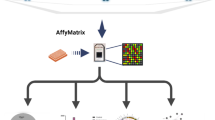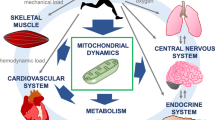Abstract
Energy expenditure decreases with age, but in the oldest-old, energy demand for maintenance of body functions increases with declining health. Uncoupling proteins have profound impact on mitochondrial metabolic processes; therefore, we focused attention on mitochondrial uncoupling protein genes. Alongside resting metabolic rate (RMR), two SNPs in the promoter region of UCP2 were associated with healthy aging. These SNPs mark potential binding sites for several transcription factors; thus, they may affect expression of the gene. A third SNP in the 3′-UTR of UCP3 interacted with RMR. This UCP3 SNP is known to impact UCP3 expression in tissue culture cells, and it has been associated with body weight and mitochondrial energy metabolism. The significant main effects of the UCP2 SNPs and the interaction effect of the UCP3 SNP were also observed after controlling for fat-free mass (FFM) and physical-activity related energy consumption. The association of UCP2/3 with healthy aging was not found in males. Thus, our study provides evidence that the genetic risk factors for healthy aging differ in males and females, as expected from the differences in the phenotypes associated with healthy aging between the two sexes. It also has implications for how mitochondrial function changes during aging.





Similar content being viewed by others
References
Acosta A et al (2015) Association of UCP-3 rs1626521 with obesity and stomach functions in humans. Obes (Silver Spring) 23:898–906. doi:10.1002/oby.21039
Anand G, Shapiro DN, Dickman PS, Prochownik EV (1994) Rhabdomyosarcomas do not contain mutations in the DNA binding domains of myogenic transcription factors. J Clin Invest 93:5–9. doi:10.1172/jci116982
Andrews ZB, Horvath TL (2009) Uncoupling protein-2 regulates lifespan in mice. Am J Physiol Endocrinol Metab 296:E621–E627. doi:10.1152/ajpendo.90903.2008
Ayyasamy V et al (2011) Cellular model of Warburg effect identifies tumor promoting function of UCP2 in breast cancer and its suppression by genipin. PLoS One 6:e24792. doi:10.1371/journal.pone.0024792
Barrett JC (2009) Haploview: visualization and analysis of SNP genotype data. Cold Spring Harb Protoc 2009:pdb ip71. doi:10.1101/pdb.ip71
Battistelli C, Busanello A, Maione R (2014) Functional interplay between MyoD and CTCF in regulating long-range chromatin interactions during differentiation. J Cell Sci 127:3757–3767. doi:10.1242/jcs.149427
Boss O et al (1997) Uncoupling protein-3: a new member of the mitochondrial carrier family with tissue-specific expression. FEBS Lett 408:39–42
Bouchard C, Perusse L, Chagnon YC, Warden C, Ricquier D (1997) Linkage between markers in the vicinity of the uncoupling protein 2 gene and resting metabolic rate in humans. Hum Mol Genet 6:1887–1889
Boyle AP et al (2012) Annotation of functional variation in personal genomes using RegulomeDB. Genome Res 22:1790–1797. doi:10.1101/gr.137323.112
Brand MD et al (2004) Mitochondrial superoxide: production, biological effects, and activation of uncoupling proteins. Free Radic Biol Med 37:755–767. doi:10.1016/j.freeradbiomed.2004.05.034
Cao Y et al (2010) Genome-wide MyoD binding in skeletal muscle cells: a potential for broad cellular reprogramming. Dev Cell 18:662–674. doi:10.1016/j.devcel.2010.02.014
Crocco P, Montesanto A, Passarino G, Rose G (2011) A common polymorphism in the UCP3 promoter influences hand grip strength in elderly people. Biogerontology 12:265–271. doi:10.1007/s10522-011-9321-z
Dato S, Soerensen M, Montesanto A, Lagani V, Passarino G, Christensen K, Christiansen L (2012) UCP3 polymorphisms, hand grip performance and survival at old age: association analysis in two Danish middle aged and elderly cohorts. Mech Ageing Dev 133:530–537. doi:10.1016/j.mad.2012.06.004
Delgado-Olguin P, Brand-Arzamendi K, Scott IC, Jungblut B, Stainier DY, Bruneau BG, Recillas-Targa F (2011) CTCF promotes muscle differentiation by modulating the activity of myogenic regulatory factors. J Biol Chem 286:12483–12494. doi:10.1074/jbc.M110.164574
Dipietro L, Caspersen CJ, Ostfeld AM, Nadel ER (1993) A survey for assessing physical activity among older adults. Med Sci Sports Exerc 25:628–642
Echtay KS (2007) Mitochondrial uncoupling proteins–what is their physiological role? Free Radic Biol Med 43:1351–1371. doi:10.1016/j.freeradbiomed.2007.08.011
Echtay KS et al (2002) Superoxide activates mitochondrial uncoupling proteins. Nature 415:96–99. doi:10.1038/415096a
Filippova GN et al (1996) An exceptionally conserved transcriptional repressor, CTCF, employs different combinations of zinc fingers to bind diverged promoter sequences of avian and mammalian c-myc oncogenes. Mol Cell Biol 16:2802–2813
Frisard MI et al (2007) Aging, resting metabolic rate, and oxidative damage: results from the Louisiana Healthy Aging Study. J Gerontol A Biol Sci Med Sci 62:752–759
Gallagher IM, Jenner P, Glover V, Clow A (2000) CuZn-superoxide dismutase transgenic mice: no effect on longevity, locomotor activity and 3H-mazindol and 3H-spiperone binding over 19 months. Neurosci Lett 289:221–223
Gimeno RE et al (1997) Cloning and characterization of an uncoupling protein homolog: a potential molecular mediator of human thermogenesis. Diabetes 46:900–906
Ho PW et al (2012) Uncoupling protein-4 (UCP4) increases ATP supply by interacting with mitochondrial Complex II in neuroblastoma cells. PLoS One 7:e32810. doi:10.1371/journal.pone.0032810
Hsu YH, Niu T, Song Y, Tinker L, Kuller LH, Liu S (2008) Genetic variants in the UCP2-UCP3 gene cluster and risk of diabetes in the Women’s Health Initiative Observational Study. Diabetes 57:1101–1107. doi:10.2337/db07-1269
Hurtaud C, Gelly C, Chen Z, Levi-Meyrueis C, Bouillaud F (2007) Glutamine stimulates translation of uncoupling protein 2mRNA. Cell Mol Life Sci 64:1853–1860. doi:10.1007/s00018-007-7039-5
Jaburek M et al (1999) Transport function and regulation of mitochondrial uncoupling proteins 2 and 3. J Biol Chem 274:26003–26007
Jazwinski SM et al (2010) HRAS1 and LASS1 with APOE are associated with human longevity and healthy aging. Aging Cell 9:698–708. doi:10.1111/j.1474-9726.2010.00600.x
Kim S, Jazwinski SM (2015) Quantitative measures of healthy aging and biological age. Healthy Aging Res. doi:10.12715/har.2015.4.26
Kim D, Jitrapakdee S, Thompson M (2007) Differential regulation of the promoter activity of the mouse UCP2 and UCP3 genes by MyoD and myogenin. J Biochem Mol Biol 40:921–927
Kim S, Welsh DA, Cherry KE, Myers L, Jazwinski SM (2013) Association of healthy aging with parental longevity. Age (Dordr) 35:1975–1982. doi:10.1007/s11357-012-9472-0
Kim S, Welsh DA, Ravussin E, Welsch MA, Cherry KE, Myers L, Jazwinski SM (2014) An elevation of resting metabolic rate with declining health in nonagenarians may be associated with decreased muscle mass and function in women and men, respectively. J Gerontol A Biol Sci Med Sci 69:650–656. doi:10.1093/gerona/glt150
Klaus S, Casteilla L, Bouillaud F, Ricquier D (1991) The uncoupling protein UCP: a membraneous mitochondrial ion carrier exclusively expressed in brown adipose tissue. Int J Biochem 23:791–801
Krauss S, Zhang CY, Lowell BB (2002) A significant portion of mitochondrial proton leak in intact thymocytes depends on expression of UCP2. Proc Natl Acad Sci USA 99:118–122. doi:10.1073/pnas.012410699
Krauss S, Zhang CY, Lowell BB (2005) The mitochondrial uncoupling-protein homologues. Nat Rev Mol Cell Biol 6:248–261. doi:10.1038/nrm1572
Kwok KH et al (2010) Mitochondrial UCP5 is neuroprotective by preserving mitochondrial membrane potential, ATP levels, and reducing oxidative stress in MPP+ and dopamine toxicity. Free Radic Biol Med 49:1023–1035. doi:10.1016/j.freeradbiomed.2010.06.017
Matthias A, Ohlson KBE, Fredriksson JM, Jacobsson A, Nedergaard J, Cannon B (2000) Thermogenic responses in brown fat cells are fully UCP1-dependent: UCP2 or UCP3 do not substitute for UCP1 in adrenergically or fatty acid-induced thermogenesis. J Biol Chem 275:25073–25081. doi:10.1074/jbc.M000547200
Mookerjee SA, Divakaruni AS, Jastroch M, Brand MD (2010) Mitochondrial uncoupling and lifespan. Mech Ageing Dev 131:463–472. doi:10.1016/j.mad.2010.03.010
Musa CV et al (2012) Four novel UCP3 gene variants associated with childhood obesity: effect on fatty acid oxidation and on prevention of triglyceride storage. Int J Obes (Lond) 36:207–217. doi:10.1038/ijo.2011.81
Pecqueur C et al (2001) Uncoupling protein 2, in vivo distribution, induction upon oxidative stress, and evidence for translational regulation. J Biol Chem 276:8705–8712. doi:10.1074/jbc.M006938200
Pecqueur C et al (2008) Uncoupling protein-2 controls proliferation by promoting fatty acid oxidation and limiting glycolysis-derived pyruvate utilization. Faseb J 22:9–18. doi:10.1096/fj.07-8945com
R_Core_Team (2014) R: a language and environment for statistical computing. R Foundation for Statistical Computing, Vienna
Rose G, Crocco P, De Rango F, Montesanto A, Passarino G (2011) Further support to the uncoupling-to-survive theory: the genetic variation of human UCP genes is associated with longevity. PLoS One 6:e29650. doi:10.1371/journal.pone.0029650
Rosenbloom KR et al (2015) The UCSC Genome Browser database: 2015 update. Nucleic Acids Res 43:D670–D681. doi:10.1093/nar/gku1177
Rousset S, Alves-Guerra MC, Mozo J, Miroux B, Cassard-Doulcier AM, Bouillaud F, Ricquier D (2004) The biology of mitochondrial uncoupling proteins. Diabetes 53(Suppl 1):S130–S135
Ruggiero C, Ferrucci L (2006) The endeavor of high maintenance homeostasis: resting metabolic rate and the legacy of longevity. J Gerontol A Biol Sci Med Sci 61:466–471
Schrauwen P, Xia J, Walder K, Snitker S, Ravussin E (1999) A novel polymorphism in the proximal UCP3 promoter region: effect on skeletal muscle UCP3 mRNA expression and obesity in male non-diabetic Pima Indians. Int J Obes Relat Metab Disord 23:1242–1245
Schrauwen P, Hesselink MK, Blaak EE, Borghouts LB, Schaart G, Saris WH, Keizer HA (2001) Uncoupling protein 3 content is decreased in skeletal muscle of patients with type 2 diabetes. Diabetes 50:2870–2873
Thomas SA, Palmiter RD (1997) Thermoregulatory and metabolic phenotypes of mice lacking noradrenaline and adrenaline. Nature 387:94–97
Velloso LA, Degasperi GR, Vercesi AE, Saad MA (2009) Methods for assessing and modulating UCP2 expression and function. Methods Enzymol 457:395–404. doi:10.1016/s0076-6879(09)05022-8
Vozza A et al (2014) UCP2 transports C4 metabolites out of mitochondria, regulating glucose and glutamine oxidation. Proc Natl Acad Sci USA 111:960–965. doi:10.1073/pnas.1317400111
Warburg O (1956) On respiratory impairment in cancer cells. Science 124:269–270
Zhang CY et al (2001) Uncoupling protein-2 negatively regulates insulin secretion and is a major link between obesity, beta cell dysfunction, and type 2 diabetes. Cell 105:745–755
Zhang Y et al (2009) Mice deficient in both Mn superoxide dismutase and glutathione peroxidase-1 have increased oxidative damage and a greater incidence of pathology but no reduction in longevity. J Gerontol A Biol Sci Med Sci 64:1212–1220. doi:10.1093/gerona/glp132
Acknowledgments
We thank the people of Louisiana for participation in our studies. We also thank Katie Kwong, Natalie Harold, and Tiffany Kaul in graduate programs for their help with data management. This study was supported by grants from the National Institute on Aging of the National Institutes of Health (P01AG022064 to S.M.J.), the National Institute of General Medical Sciences of the National Institutes of Health (P20GM103629) to S.M.J. and S.K., the Louisiana Board of Regents through the Millennium Trust Health Excellence Fund [HEF(2001–06)-02] to S.M.J, Support from Pennington NORC P30DK072476 (E.R.), and by the Louisiana Board of Regents RC/EEP Fund through the Tulane-LSU CTRC at LSU Interim University Hospital.
Author information
Authors and Affiliations
Corresponding author
Ethics declarations
Conflicts of interests
None declared.
Rights and permissions
About this article
Cite this article
Kim, S., Myers, L., Ravussin, E. et al. Single nucleotide polymorphisms linked to mitochondrial uncoupling protein genes UCP2 and UCP3 affect mitochondrial metabolism and healthy aging in female nonagenarians. Biogerontology 17, 725–736 (2016). https://doi.org/10.1007/s10522-016-9643-y
Received:
Accepted:
Published:
Issue Date:
DOI: https://doi.org/10.1007/s10522-016-9643-y




